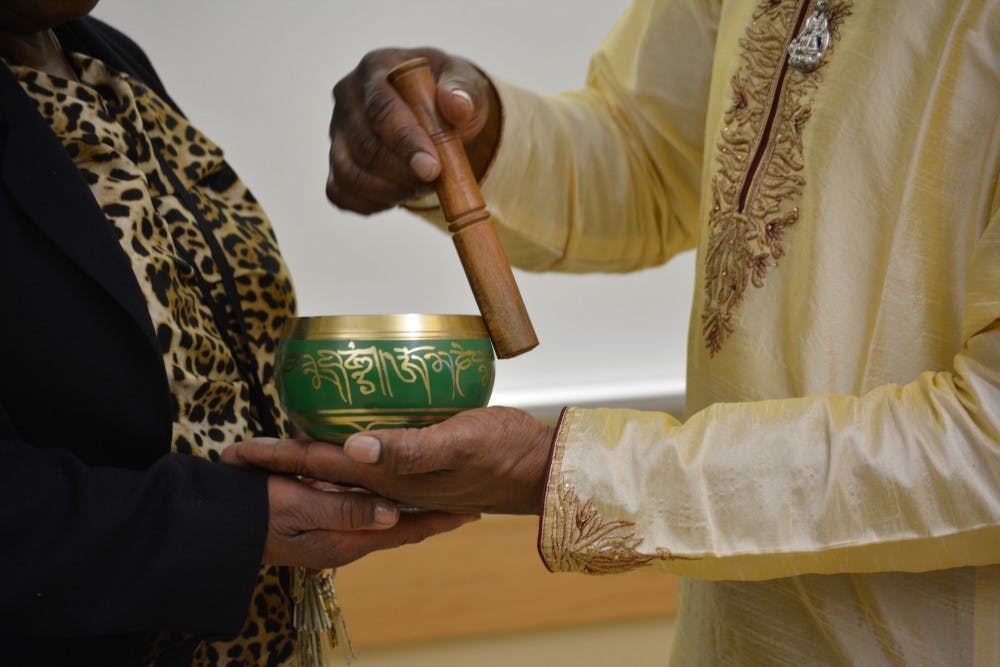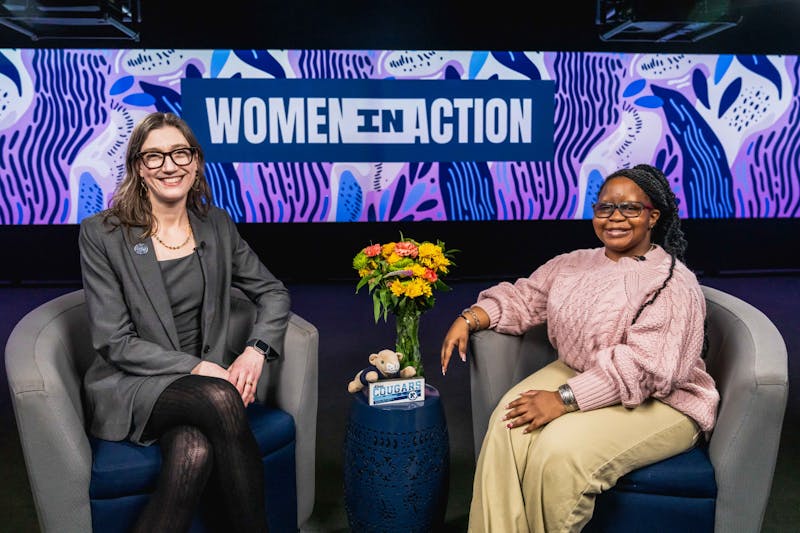New this semester, Kean University's School of Communication Media, & Journalism now offers a Topics in Communication Course: Holistic Health.
The course is taught by Dr. Janet Yedes and the only prerequisite is COMM 1402: Speech Communication as Critical Citizenship.
The class is designed for students to become more self aware of their bodily constitution and their state of health. Students in this course will be able to plan effective diets for themselves, learn what questions they should be asking of their physician and communicate with those in their communities about critical health concerns in terms of prevention and treatment plans.
Every class begins with a chant to Ganesh, who is more commonly recognizable as the elephant headed God of wisdom and learning.
Yedes created the new course and was very excited about it.
"We've always had a health communication course, but in this case it's holistic health communication," Yedes said. "I was able to bring Ayurveda as well as just update nationally that there are people working in holistic health within the field of communication, so we have some of those authors for our texts."
One of the texts used in the course is written by Dr. Vasant Lad and is called Textbook of Ayurveda: Fundamental Principles. The other text used is Athena du Pre's Communicating about Health: Current Issues and Perspectives. Both texts work hand-in-hand throughout the course to address concerns of health communication and inform on Ayurvedic tradition.
Yedes brings to the course extensive knowledge of Ayurvedic tradition, which is a 5,000 year old medical science she has been fortunate enough to study with Lad.
"'Ayur' meaning life in sanskrit and 'Veda' meaning the science or knowledge of the Vedas," Yedes explained.
She also brings to the course information and experience in traditional Chinese medicine, Tibetan medicine and Indigenous medicine.
Always having an interest in holistic health communication, she has attended National Communication Association conferences and has tracked a variety of holistic health conferences.
Medicines of the Earth is one of those conferences she will be attending this summer. At this conference, there will be biochemists, traditional medicine practitioners, the people growing the plants, midwives, nurse practitioners, native people trained in medicine from plants and herbalists.
"Plants give us life and give us exchange of oxygen; it's kind of a beautiful interdependence that we have with nature," Yedes said.
Yedes begins all of her courses with the concept of self knowledge, whether she is teaching culture or holistic health. Self knowledge is especially important in holistic health because of the relationship between mind, body and spirit.
"Starting from that within knowledge, even when we wake up on a daily basis, before we interact with others, kind of just knowing where we are and a little bit about who we are," Yedes said. "This on going kind of dynamic identity that people are developing, especially students as they're starting their young adult lives, exploring the world and learning so much as an undergraduate."
In other words, self knowledge can be described as intrapersonal communication, but Yedes prefers the preceding term.
"As we're doing in the course, looking at the Yama/Niyama's from kind of yogic tradition where we take something and we look more in depth about our moment to moment awareness about how we're living our lives, speaking to other people [and] how other people are communicating with us," Yedes said.
"Yama" is defined as restraints and "Niyama" is defined as practices. The two provide guidelines for healthy living physically and mentally. Students are to focus on the Yama or Niyama assigned for the week and journal about their experience and reflection of it every day.
Yedes has found that more and more regular citizens are turning to the world of holistic health. Holistic health in the western world consists of the modern methods of allopathic doctors, psychology, acupuncture and chiropractics, among others.
"Of course there's 1,000's of year-old traditions from indigenous people using herbal medicine, using things that are more holistic with body, mind, spirit," Yedes said. "I think it is very beautiful to be able to talk about the spiritual aspects of our lives or just being good human beings in an ethical and moral aspect of our lives."
The course allows students to open up in regards to communicating about their emotions and communicating as advocates for other people and their health, as well as themselves. It teaches students how to communicate with doctors effectively in terms of being healthy and gaining the knowledge of prevention to stay balanced with an individual's health and lead fuller and richer lives and relationships.
"We all realize that when somebody's sick or out of balance, how much emotion could physically affect a family," Yedes added.
Whether families have relatives facing Alzheimer's, dementia or any other type of chronic disease, it is right in the heart of family life. This course teaches students how to communicate with themselves, with their families and with their doctors.
"I think towards the end of the semester, we will be looking at how we take, as communication majors, share that information that we are all learning in specific ways," Yedes said.
Through case studies, students were exposed to a variety of illnesses experienced globally as well as specifically in the United States that affect a lot of people. Students had the choice as to which one they wanted to focus on and sometimes that came out of a personal interest or because they are a part of a particular community being affected by that illness.
On Thursday, March 16, 2017, the class enjoyed a guest speaker named Arthur Banks III, who Yedes knows as a friend and as a holistic practitioner. Yedes met Banks in the 1970s "through a friend of a friend kind of thing." He has a particular lineage with yoga.
"He has many modalities that he works in, but I felt like he would be a good one to talk about Qi Gong and Reiki," Yedes said.
He also introduced the class to singing bowls that can be used for healing and meditation.
Yedes is impressed with her class at how much they have opened up throughout the semester, as she can see this beautifully with the Yama/Niyama weekly journals.
"I really appreciate how they're looking very deeply, honestly and courageously at themselves," Yedes said. "They're looking at what they want to balance, make good choices and making changes so that it promotes their health in body, mind, spirit."
By the end of the course, students will have an understanding of the different diseases affecting their community, how information about health gets communicated and how this information can be shared with their community and with themselves.
Students will also create their own daily routine that is based on their Prakruti, which is their first breathe as said in Ayurveda. They will also develop an appropriate diet based upon their Doshic (Vata, Pitta, Kapha) qualities that keeps them in balance and as healthy as possible.
"So I hope that they will actually have things they can communicate as well as enhance their own health journey going forward," Yedes said, "that would be the vision."
As it is the first semester the course is being run, the class consists of mostly communication majors. But many students in the course have varying interests in health disciplines they would like to focus on.
"I think as the word gets out, it would be nice to get some of the other health oriented disciplines participating," Yedes added.
Yedes teaches a variety of other classes including the communications capstone class, cinema as multicultural communication, a graduate multi-culture course, conflict resolution and a gender class to be taught in the fall semester.
She also teaches another Topics in Communications class called Communicating Social Justice. Yedes receives a lot of positive feedback on this course and many of her students feel that the class should be required for all students at Kean.
"I'm loving the holistic health comm, it's my first time but I look forward to teaching it again," Yedes said.






